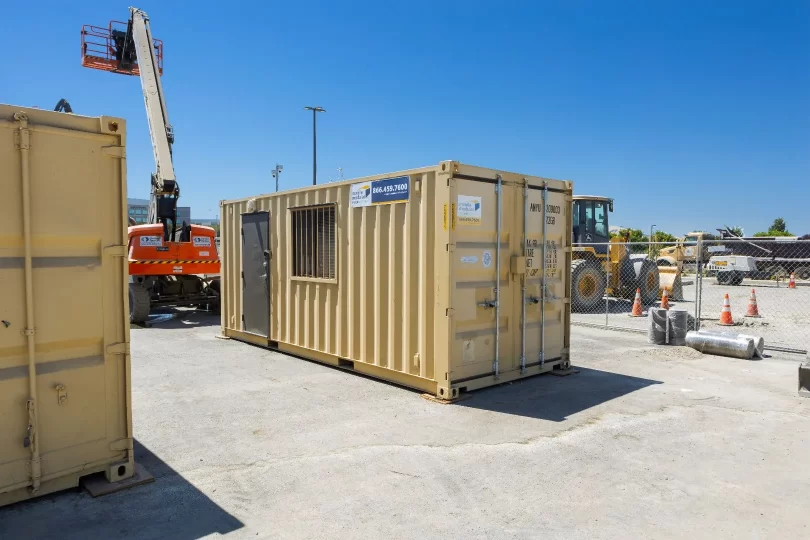The guy had a Bluetooth earpiece, a faded hoodie, and zero intention of refunding my money. “It’s wind and watertight,” he said, knocking on a door that barely shut. It wasn’t. It wasn’t even dry.
That was my first time buying a shipping container in Chicago.
It was also the last time I trusted a backlot vendor with no photos, no paperwork, and no last name.
So here’s what I wish I’d known before handing over cash for what was essentially a glorified raccoon shelter. If you’re looking for shipping containers for sale in Chicago—real ones, that don’t leak or stink—read this first.
All Steel Is Not Equal
Just because it looks tough doesn’t mean it’ll survive a February in Cook County.
Here’s your cheat sheet:
- One-Trip: Basically brand-new. Used once to haul cargo, then retired early. Think of it like demo shoes—worn once, no wear. Best for conversions.
- Cargo-Worthy (CW): Structurally sound, no major damage. Could still sail across the ocean. Can take a beating.
- Wind and Watertight (WWT): Keeps the rain out. Great for static storage, not so great if you care about aesthetics.
- As-Is: This is the wild card. Could be fine. Could also have a busted floor, doors that don’t close, and a few bonus squirrels.
Spoiler: Most Craigslist ads don’t tell you which category you’re looking at. That’s intentional.
Local Hustlers vs National Players
So who do you trust?
There’s the guy with three containers in a South Loop alley and a burner phone. Then there’s Conexwest, a national company that delivers locally, posts real specs, and—this is big—offers warranties.
If you’re a “need to see it in person” type, local yards can be a good move. Just vet them like you would a used car lot. Ask for serial numbers. Request inspection reports. And don’t be afraid to walk away.
But if you want reliability, inventory, and someone who won’t ghost you mid-transaction? National vendors with Chicago coverage are the safer bet.
Red Flags and Deal Breakers
Let’s talk inspection.
Before you fall in love with a container (yes, it happens), check the details:
- Floor: Should be solid marine-grade plywood. No oil stains. No rot. Definitely no mystery smells.
- Doors: Do they open and close without needing a crowbar and prayer?
- Seals: If light shines through, water probably will too.
- Undercarriage: Rust here is a dealbreaker. This isn’t the part you can easily fix.
- Ventilation: If you’re storing anything that breathes—or doesn’t like mold—you’ll need it.
If they won’t let you look underneath, that’s your cue to leave. No, you don’t need to “trust the process.” This isn’t a yoga class.
Yes, Permits Are a Thing
Thinking of dropping one in your backyard? Better read up.
Chicago is not the kind of place where you can quietly install a steel box and hope the neighbors don’t notice. Whether it’s a shed, a studio, or your post-apocalyptic prep bunker, zoning rules apply.
The Department of Buildings may require permits, inspections, even engineering reports depending on your use case. And if you’re dreaming of a container home—yes, it’s possible—you’ll be facing everything from insulation codes to fire safety regulations.
Moral of the story: don’t get too creative without doing some paperwork first.
Form Follows Function (Every Time)
Before you buy, ask yourself this: What am I actually using this thing for?
- Storage: Go WWT or CW. Just make sure it’s clean and secure.
- Retail conversion: You’ll want a one-trip, side-opening container with a clean history (no pesticides, no chemical residue).
- Tiny home or office: Same as above, plus insulation, windows, and probably therapy when you realize the floor isn’t level.
Pro tip: Forklift pockets are non-negotiable if you’re moving it more than once. Trust me—containers don’t roll easily on gravel.
Wrap-Up: Don’t Buy a Lemon in a Steel Suit
Chicago’s container market is legit—but chaotic. And that’s exactly why you need to shop smart. Look for transparency. Inspect before buying. And when in doubt, go with someone who’s in the business of containers, not just flipping steel for beer money.
Trust yourself instead. Do your homework. And if the deal feels shady? Walk away.
There’s always another container. Probably one that doesn’t leak.







